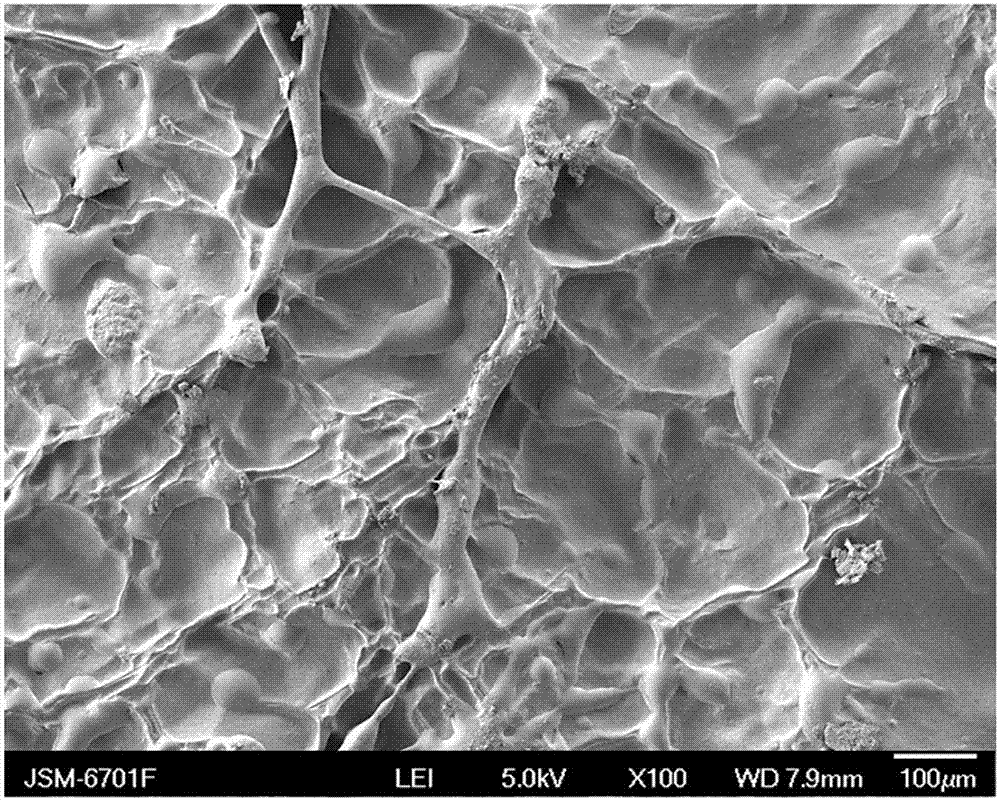Method for preparing composite hydrogel of sodium alginate and artemisia desertorum seed gum
A technology of composite hydrogel and sodium alginate, applied in the fields of biological materials and tissue engineering materials, can solve the problems of inability to form a uniform gel and application difficulties of artemisia gum, and achieve enhanced water absorption and mechanical properties, low cost, The effect of expanding the scope of application
- Summary
- Abstract
- Description
- Claims
- Application Information
AI Technical Summary
Problems solved by technology
Method used
Image
Examples
Embodiment 1
[0029] (1) Measure Na at room temperature 2 CO 3 Solution (0.2 mol / L) 100 mL, add 20 mL sodium polystyrene sulfonate (4 g / L), stir well and pour 100 mL CaCl 2 solution (0.2 mol / L), stirred at 1500 rpm for 10 min, and then centrifuged at 4500 rpm to collect the precipitate; the precipitate was washed three times in acetone and distilled water successively; at 0.07 Suction filtration under MPa; collect the filter cake and dry at 60°C for 8 hours to obtain microporous calcium carbonate;
[0030] (2) Weigh 0.03 g of microporous calcium carbonate, add it to sodium alginate solution (the mass ratio of sodium alginate to water is 1:100), and stir evenly to obtain a mixed solution of microporous calcium carbonate-sodium alginate;
[0031] (3) Weigh 0.15g of artemisia gum, add it to 15mL of absolute ethanol, stir evenly, and drop it into the mixed solution of microporous calcium carbonate-sodium alginate at a speed of 1500 rpm at a rate of 10 drops / min , to obtain a mixed s...
Embodiment 2
[0035] (1) Measure Na at room temperature 2 CO 3 Solution (0.3 mol / L) 100 mL, add 20 mL sodium polystyrene sulfonate (3 g / L), stir well and pour 100 mL CaCl 2 solution (0.3 mol / L), stirred at 2000 rpm for 5 min, and then centrifuged at 3500 rpm to collect the precipitate; the precipitate was washed three times in acetone and distilled water successively, at 0.06 Suction filtration under the condition of MPa, the collected filter cake was dried at 60°C for 7 hours to obtain microporous calcium carbonate;
[0036] (2) Weigh 0.04 g of microporous calcium carbonate, add it to sodium alginate solution (the mass ratio of sodium alginate to water is 1:200), and stir evenly to obtain a mixed solution of microporous calcium carbonate-sodium alginate;
[0037] (3) Weigh 0.075g of artemisia gum, add it into 15mL of absolute ethanol and stir evenly, then drop it into the mixed solution of microporous calcium carbonate-sodium alginate at a speed of 15 drops / min at 1500 rpm , to...
Embodiment 3
[0041] (1) Measure Na at room temperature 2 CO 3 Solution (0.3 mol / L) 100 mL, add 20 mL sodium polystyrene sulfonate (2 g / L), stir well and pour 100 mL CaCl 2 solution (0.3 mol / L), stirred at 1800 rpm for 8 min, and then centrifuged at 4000 rpm to collect the precipitate; the precipitate was washed three times in acetone and distilled water successively, and the Under the condition of suction filtration, the collected filter cake was dried at 60°C for 6 hours to obtain microporous calcium carbonate;
[0042] (2) Weigh 0.05 g of microporous calcium carbonate, add it into sodium alginate solution (the mass ratio of sodium alginate to water is 1:50), and stir evenly to obtain a mixed solution of microporous calcium carbonate-sodium alginate;
[0043] (3) Weigh 0.045g of artemisia gum, add it to 15mL of absolute ethanol, stir evenly, and drop it into the mixed solution of microporous calcium carbonate-sodium alginate at a speed of 20 drops / min at 1800 rpm , to obtain a...
PUM
| Property | Measurement | Unit |
|---|---|---|
| Storage modulus | aaaaa | aaaaa |
| Storage modulus | aaaaa | aaaaa |
| Storage modulus | aaaaa | aaaaa |
Abstract
Description
Claims
Application Information
 Login to View More
Login to View More - R&D
- Intellectual Property
- Life Sciences
- Materials
- Tech Scout
- Unparalleled Data Quality
- Higher Quality Content
- 60% Fewer Hallucinations
Browse by: Latest US Patents, China's latest patents, Technical Efficacy Thesaurus, Application Domain, Technology Topic, Popular Technical Reports.
© 2025 PatSnap. All rights reserved.Legal|Privacy policy|Modern Slavery Act Transparency Statement|Sitemap|About US| Contact US: help@patsnap.com



